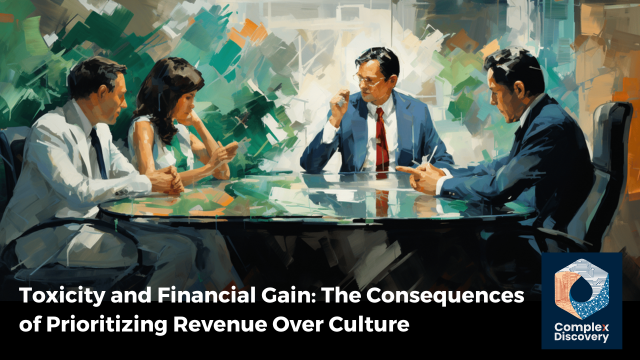[EDRM Editor’s Note: This article was first published July 21, 2023 and EDRM is grateful to Rob Robinson and ComplexDiscovery for permission to republish.]

ComplexDiscovery Editor’s Note: This topical overview on toxicity and financial gain addresses a significant challenge lurking beneath the surface of many legal tech companies: the need to identify and rectify toxic behavior. Despite the industry’s reputation for innovation and agility, substantial issues persist, including toxic cultures, an overemphasis on financial gain, and the troubling practice of rewarding toxic behavior based on revenue contribution. These issues are crucial for professionals within the legal tech industry, as a toxic atmosphere can inhibit communication, suppress innovation, and breed fear and stress, significantly influencing performance and productivity. This article aims to illuminate these challenges and their real-world implications. Through its exploration, it also underscores, by implication, the transformative power of change. The message is clear and hopeful: if individuals can change, cultures can too. This transformative potential resonates across industries and professions and can help translate big ideas into sustainable success.
As we journey through various stages in our careers, it’s important to remember that people can and do change. It’s not unusual for individuals who once exhibited toxic behavior to transform and ultimately become champions of trust and respect. However, this transformation doesn’t happen in a vacuum. It requires a catalyst for change, which may come in the form of self-realization or specific leadership intervention.
Rob Robinson, ComplexDiscovery
Industry Feature Article
Toxicity and Financial Gain: The Consequences of Prioritizing Revenue Over Culture
ComplexDiscovery Staff
In the legal tech marketplace, innovation, agility, and a relentless pursuit of the next big thing is the name of the game. However, beneath the surface of this dynamic industry, three pervasive issues often undermine its potential: the presence of toxic cultures within companies, an overemphasis on financial gain over a positive culture, and the dangerous practice of rewarding toxic behavior based on revenue contribution.
Understanding Toxic Cultures
Toxic cultures are those where internal practices negatively impact the broader work environment. They may foster bullying, sabotage, or constant negativity, creating a hostile atmosphere that hampers productivity and morale. Such toxicity can be particularly damaging in the legal tech industry, where collaboration and creativity are essential. For instance, a culture that allows toxic employees to belittle others can stifle open communication and idea-sharing, leading to a decline in company performance.
The High Cost of Toxicity
The cost of toxic cultures extends beyond the immediate business dynamics. Increased turnover, lost productivity and innovation, and potential legal fees associated with harassment or discrimination lawsuits can have a significant financial impact. Many legal tech companies have faced public and private backlash and financial repercussions due to a toxic culture. Moreover, intangible costs, such as damaged morale, decreased innovation, and a tarnished company reputation, can have long-lasting effects that are difficult to quantify but equally damaging.
Research underscores the significant financial and cultural costs of toxic cultures. Studies have found that such cultures cost U.S. companies nearly $50 billion annually. Moreover, during the first six months of the so-called “Great Resignation,” a toxic culture was the primary predictor of employee turnover. As companies grapple with talent retention and understand the link between diversity and improved business outcomes, the importance of addressing toxic cultures becomes even more evident.
Read the entire article here.

